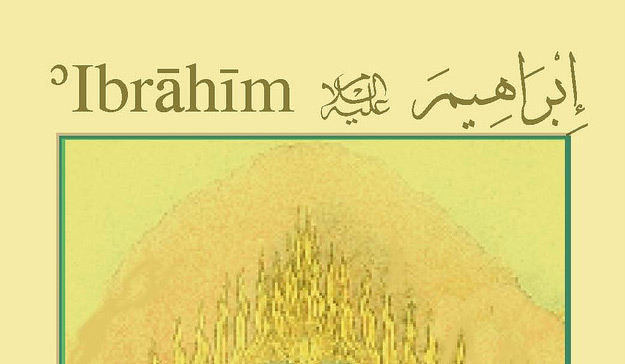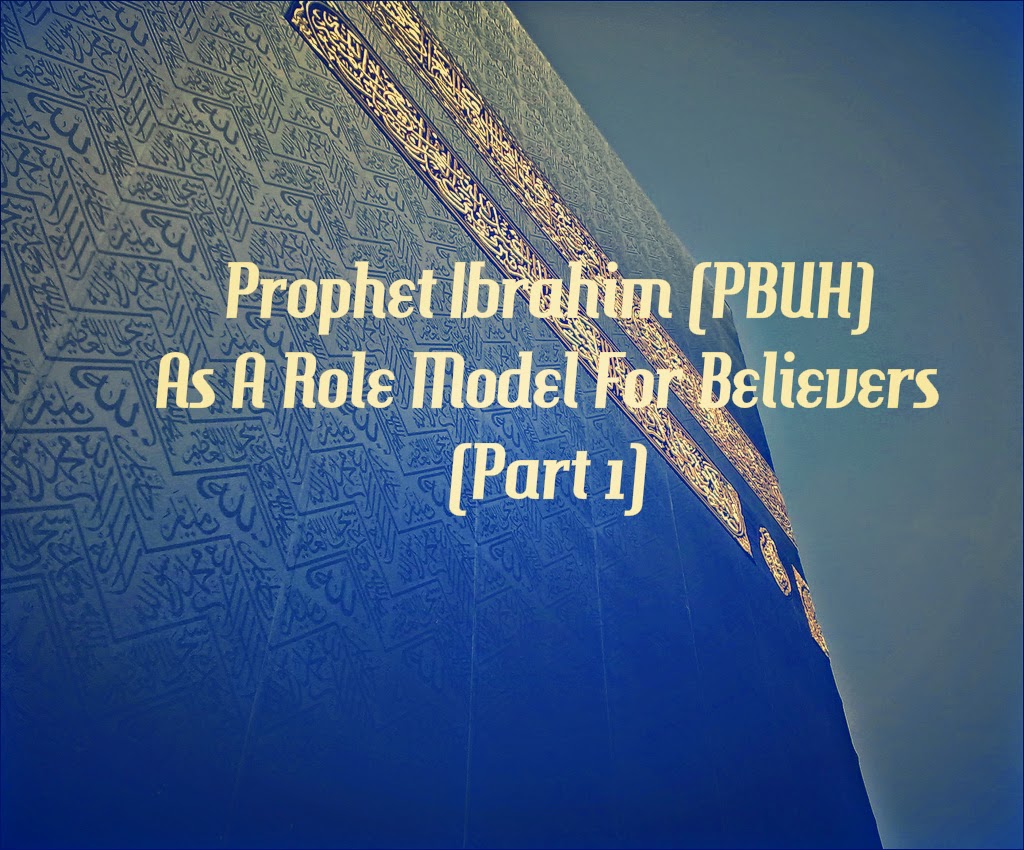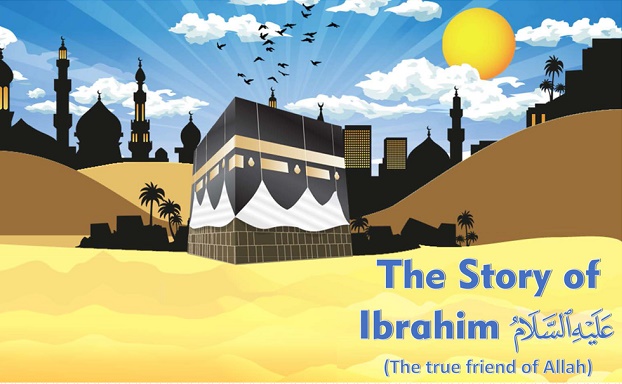One of the prophets given the most attention in the Quran is the prophet Abraham. The Quran tells of him and his unwavering belief in God, first calling him to reject his people and their idolatry, and later to prove true to various tests which God places before him.

In Islam, Abraham is seen as a strict monotheist who calls his people to the worship of God alone. For this belief, he bears great hardships, even disassociating himself with his family and people through migration to various lands. He is one who fulfills various commandments of God through which he is tested, proving true to each one.
Due to this strength of faith, the Quran attributes the one and only true religion to be the “Path of Abraham”, even though prophets before him, such as Noah, called to the same faith. Because of his tireless act of obedience to God, He gave him the special title of “Khaleel”, or beloved servant, not given to any other Prophet before. Due to the excellence of Abraham, God made prophets from his progeny, from them Ishmael Isaac, Jacob (Israel) and Moses, guiding people to the truth.
The lofty status of Abraham is one shared by Judaism, Christianity and Islam alike. The Jews see him to be epitome of virtue as he fulfilled all the commandments although before they were revealed, and was the first to come to the realization of the One True God. He is seen as the father of the chosen race, the father of prophets due to which God started his series of
revelations.In Christianity, he is seen as the father of all believers
(Romans 4:11) and his trust in God and sacrifice is taken as a model for later saints (Hebrews 11).
As Abraham is given such importance, it is worthy that one study his life and investigate those aspects which raised him to the level which God gave him.
Although the Quran and the Sunnah do not given the details of the whole life of Abraham, they do mention certain facts worthy of note. As with other Qur’anic and biblical figures, the Quran and Sunnah detail aspects of their lives as a clarification of some misguided beliefs of previously revealed religions, or those aspects which contain certain mottos and morals worthy of note and emphasis.

His Name
In the Quran, the only name given to Abraham is “Ibraheem” and “Ibrahaam”, all sharing the original root, b-r-h-m. Although in the Bible Abraham is known as Abram at first, and then God is said to change his name to Abraham, the Quran has kept silent on this subject, neither affirming nor negating it. Modern Judeo-Christian scholars do doubt, however, in story of the changing of his names and their respective meanings, calling it “popular world play”. Assyriologists suggest that the Hebrew letter Hê (h) in the Minnan dialect is written in stead of a long ‘a’ (ā), and that the difference between Abraham and Abram is merely dialectical. The same can be said for the names Sarai and Sarah, as their meanings are also identical.
His Homeland
Abraham is estimated to have been born 2,166 years before Jesus in or around the Mesopotamian city of Ur, 200 miles southeast of present-day Baghdad. His father was ‘Aazar’,
‘Terah’ or ‘Terakh’ in the Bible, an idol worshipper, who was from the descendants of Shem, the son of Noah. Some scholars of exegesis suggest that he may have been called Azar after an idol he was devoted to. He is likely to have been Akkadian, a Semitic people from the Arabian Peninsula who settled in Mesopotamia sometime in the third millennium BCE.
It seems as if Azar migrated along with some of his relatives to the city of Haran in the early childhood of Abraham before the confrontation with his people, although some Judeo-Christian traditions tell it to be later in his life after he is rejected in his native city. In the Bible, Haran, one of the brothers of Abraham is said to have died in Ur, “in the land of his nativity” (Genesis 11:28), but he was much older than Abraham, as his other brother Nahor takes Haran’s daughter as a wife (Genesis 11:29). The bible also makes no mention of the migration of Abraham to Haran, rather the first command to migrate is that out of Haran, as if they had settled there before (Genesis 12:1-5).If we take the first command to mean the emigration from Ur to Canaan, there seems to be no reason that Abraham would dwell with his family in Haran, leaving his father there and proceeding to Canaan thereafter, not to mention its geographical improbability [See map].
The Quran does mention the migration of Abraham, but it does so after Abraham disassociates himself from his father and tribesmen due to their disbelief. If he had been in Ur at that time, it seems unlikely that his father would go with him to Haran after disbelieving and torturing him along with his townspeople. As to why they chose to migrate, archaeological evidence suggests that Ur was a great city which saw its rise and fall within the lifetime of Abraham, so they may have been forced to leave due to environmental hardships. They may have chosen Haran due to it sharing the same religion as Ur.
Abraham and His Father
Like those around him, Abraham’s father Azar (Terah or Terakh in the Bible), was an idol worshipper. Biblical tradition tells of him actually being a sculptor of them, hence Abraham’s first call was directed to him. He addressed him with clear logic and sense, understood by a young man like himself as well as the wise.
“And mention in the Book (the Quran) Abraham, indeed he was a man of truth, a Prophet. When he said to his father: “O my Father! Why do you worship that which hears not, sees not and cannot avail you in anything? O my father! Verily! There has come to me of knowledge that which came not unto you. So follow me. I will guide you to a Straight Path.” (Quran 19:41-43)
The reply from his father was rejection, an obvious reply by any person challenged by another much younger than them, a challenge made against years of tradition and norm.
“He (the father) said: ‘Do you reject my gods, O Abraham?
If you do not stop, I will indeed stone you. So get away from me safely before I punish you.” (Quran 19:46)
Knowledge of God
Although Judeo-Christian scholars have differed as to when Abraham came to know God, at the age of three, ten, or forty-eight, the Quran is silent in mentioning the exact age at which Abraham received his first revelation. It seems it was, however, when he was young in age, as the Quran calls him a young man when his people try to execute him for rejecting their idols, and Abraham himself said to have knowledge not available to his father when he called him to worship God alone before his call spread to his people (19:43). The Quran is clear, however, in saying that he was one of the prophets to whom a scripture was revealed:
“Verily! This is in the former Scriptures. The Scriptures of Abraham and Moses.” (Quran 87:18-19).





Robertmab
On October 18, 2025 at 11:12 am
Plunge into the expansive realm of EVE Online. Start your journey today. Trade alongside thousands of explorers worldwide. Start playing for free